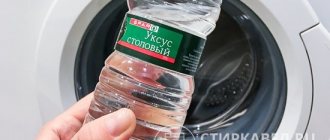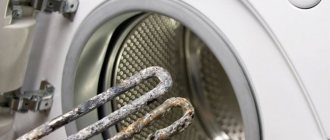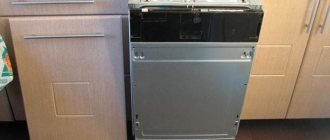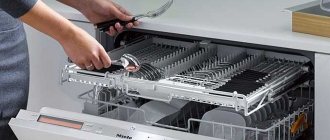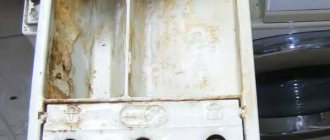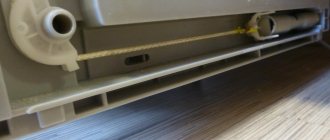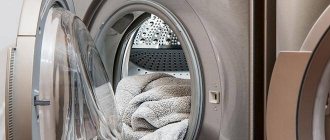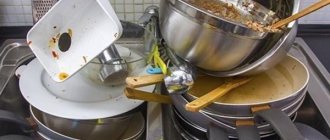We will help you choose a descaler and tell you how to effectively clean your dishwasher with minimal investment of time and money.
If you have a dishwasher, scale is a nuisance that will sooner or later touch its internal parts and surfaces. The problem is relevant due to hard water in almost all regions of our vast country.
How to clean PMM
If you don’t know how to properly clean a machine, you can throw money away and waste an expensive product that was purchased after convincing advertising.
It is important not to leave it in the dishwasher for a long time, so as not to cause harm to the pipes, circulation pump, and the surface of the hopper. In this case, it is necessary to facilitate the interaction of substances with scale so that it is separated from the PMM parts and washed out of the machine completely.
When cleaning your dishwasher with commercial products, do not neglect the instructions on the label. This is necessary to maintain the exact dosage of the powder or gel, keep it in the system for a certain period of time and timely wash it out of the machine.
Cleaning requires one wash cycle lasting no more than 40 minutes.
Basic rules of care
When operating this household appliance, adhere to the following rules:
- To ensure that your dishwasher serves you for a long time, check the water inlet hoses frequently. If necessary, clean them with a toothpick.
- Dry the rubber gasket in the door once every 2 months.
- Before washing, be sure to clean the dishes from food residues. Try not to overload the car.
- To keep your dishes sparkling clean, choose the right dishwasher cleaner. Check that the glitter and salt compartments are well filled.
To make cleaning your dishwasher easy and to prevent damage, please note that the following dishes cannot be washed in it:
- cutlery made of wood (partially or completely), since they lose their presentation, and the glue used in the manufacture of such utensils does not withstand high temperatures;
- decorative glass products that are very sensitive to external influences;
- rare porcelain or antique dishes of special manufacture;
- disposable plastic tableware;
- crystal with lead particles;
- products made from synthetic materials sensitive to high temperatures;
- copper and tin utensils;
- stainless steel items;
- articles of applied art;
- old dishes whose coating is not heat-resistant;
- products with silver and gold inserts, since when washed, the color may change and the dishes may fade.
Removing scale using folk remedies
Often the most common products are used, which can be found at the nearest hardware store or pharmacy.
Cleaning with citric acid
Using citric acid as a cleaning agent: take 200 g, pour it into the bottom of the hopper, turn on the standard washing mode and run the machine through empty - without loading dishes. Wait until halfway through the cycle, stop washing for 20 minutes, then continue the program.
The method promises excellent results, but be careful: there is a risk of destruction of the gaskets inside the structure. “Limonka” should be used extremely rarely, only if there are no other alternatives left.
Important! When pouring acid into the PMM, first wipe the walls with it. Leave for 5 minutes, then set to the longest wash cycle.
Fighting with vinegar
You can also get rid of plaque using vinegar. This is also not the safest remedy, but there is a way, and its effectiveness has been proven. Proceed like this:
- measure 2 cups vinegar;
- pour into the bottom of the hopper;
- put on gloves, take a sponge and wipe the inside of the tank with vinegar;
- start the wash;
- stop the cycle about halfway and leave the machine for half an hour;
- resume the program;
- At the end of the cycle, run the machine on express mode to completely flush out the vinegar from the systems.
Borax for scale
The method is suitable for removing a layer of scale from the walls of the hopper, door and dish baskets - over time, salt deposits “grow” on them.
Apply some borax to a soft, damp sponge and gently cover the surface in a thin layer - but do not scrub or scrub, just apply the borax without any manipulation. Leave the PMM for 20 minutes, then select any program with maximum water heating and start the machine.
At the end of the cycle, check and rinse the filter, and also inspect the surfaces to see if the borax has been washed off. If you notice any residue, wipe the walls with a sponge and start idling again.
Soda + peroxide: scale will disappear
By combining regular baking soda with such a simple ingredient as hydrogen peroxide, you will remove deposits from the heating element and wash away scale from the walls of the PMM hopper. Proceed like this:
- mix 400 g of soda with 3 tablespoons of peroxide;
Important! If desired, add a little essential oil to the mixture to ensure a pleasant aroma in the hopper. The smell will be sharp at first, but after the second wash everything will return to normal.
- roll the resulting mass into a ball and load it into the bottom of the hopper;
- start an idle wash by selecting a long program;
- wash the filter;
- repeat the program.
Mechanical cleaning of components, parts and surfaces
The more often the dishwasher is used, the more often it needs to be cleaned. For example, when using PMM daily, experts recommend cleaning it every 12-15 days. In addition to food residues, scale can also accumulate in the machine, since the hardness of the water in the tap water is often quite high. These factors must be taken into account to ensure that your kitchen assistant serves for a long time and without failure.
If you don't clean your dishwasher, it will give off an unpleasant odor.
You can clean your dishwasher from grease and scale using both well-known folk remedies and chemicals specifically designed for PMM.
Removing dirt from filters
Each dishwasher has a combined coarse and fine filter. It is located at the bottom of the chamber, next to the impeller of the sprayer (hereinafter also referred to as the sprayer). Filter elements need to be regularly cleaned from dirt and food debris. During daily use of the PMM, the filter itself must be cleaned after 5-6 operating sessions, at least.
In addition to the filter, you need to clean the mesh that frames it from dirt.
Cleaning the filter element is simple:
- Turn off the dishwasher.
- Remove the lower basket from the chamber and use a sponge to remove any remaining liquid on the bottom. If there is dirt on the framing mesh, remove it (see photo).
- Locate the filter near the spray nozzle and turn it counterclockwise 90°. In some models, the filter cup simply needs to be pulled up.
- Check the hole under the filter for dirt and solid food debris. If there are any, remove them from there; any remaining water should also be removed with a sponge.
- Check that the pump impeller rotates well. To do this, unscrew the screw and remove the cover covering it. Do not allow small objects to get under the impeller and jam it.
- Wash all filter components in warm water and a detergent that can dissolve grease. In case of severe contamination, use vinegar or citric acid. It is necessary that the fine mesh cells are free from dirt and grease.
Filter glasses for coarse and fine cleaning in PMM Bosch
In addition to the drain filters, it is necessary to regularly check the meshes of the inlet filters located at the entrance to the PMM housing and at the entrance to the inlet hose from the water supply side. These parts prevent rust from pipes and other dirt from entering the machine.
Cleaning spray nozzles
No matter how well the filter reduces the degree of water contamination, small particles can still pass through the fine mesh. If you add limescale to them, the total contaminants can clog the holes in the spray arms. Therefore, their visual inspection and periodic cleaning are also necessary.
Sprinkler nozzles that need to be checked and cleaned from time to time
The quality of washing kitchen utensils depends on the cleanliness of the holes in the rocker arms. Therefore, periodically perform the following procedure:
- Remove the upper basket from the chamber to which the spray arm is attached.
- Remove the spray arm by pulling out the latches.
- Lift out the lower basket and remove the lower spray arm.
- Remove grease deposits by washing the blades with detergent and water. Check the condition of the holes by running a stream of water into the nozzles. Clean clogged holes with a toothpick or any similar object.
- Install in reverse order.
Removing the Upper Sprinkler Arm
If you have difficulty removing the sprinklers, use the instructions for your PMM.
Removing dirt from baskets
The ingrained deposits of fatty deposits and scale are not so easy to wash off from the surface of the baskets. To make your task easier, use one of the commercially available PMM cleaning products (they will be discussed below).
Do the following:
- Place the baskets in a large container so that they fit entirely.
- Pour boiling water over them and add cleaning product.
- Leave to soak until the water cools down.
- Now use a soft brush and remove any remaining softened dirt.
Cleaning the basket from dirt with a toothbrush
Cleaning the dead space of the door and its seal
Unfortunately, the design features do not allow the dirt to be properly washed off from the bottom of the inside of the door. Therefore, deposits of food waste accumulate there. To get rid of them, wipe the area with a sponge soaked in soapy water, then wipe dry and rinse with vinegar to kill bacteria.
“Dead” zone on the inside of the door, which also requires regular maintenance
If the rubber seal framing the door is not very dirty, it is enough to wipe it with a cloth moistened with a solution of a preparation specially designed for servicing PMMs. Old dirt can be removed with a soft brush, such as a toothbrush. Other common products, such as soap, vinegar or citric acid, are not recommended because they may damage the elastic material.
Cleaning and disinfecting the chamber
To clean the inside of the dishwasher, treat the entire interior surface of the dishwasher with a sponge soaked in a solution of dishwashing detergent that dissolves grease deposits well. Pay special attention to hard-to-reach corners where the most dirt accumulates. You can use dishwasher care products.
Cleaning the dishwasher chamber
In order for an unpleasant odor to appear in the machine, the door must be opened regularly for ventilation. In particularly advanced cases, bleach will help get rid of mold. But it must be used with extreme caution, since this composition is chemically active. It can even damage the metal inside the PMM, not to mention the sealing gaskets and plastic structural elements.
Anti-lime products
Let's consider factory offers that will help you professionally deal with plaque without any extra effort. If salt, soda, borax, vinegar have already been tried or you are initially a fan of special preparations, you will find it useful to review the anti-lime substances on the market today.
Frau Schmidt complex cleaner in tablets
“Frau Schmidt” is unique in its kind, because with it it is possible to wash the machine not only from scale, but also from greasy deposits and other types of contaminants. It is precisely because of its complexity that one cannot pin high hopes on it to get rid of persistent accumulations of scale. Therefore, for a complex case it is worth choosing a more powerful composition.
Background information: French Frau Schmidt is available in packs of 2 tablets, costing about 200 rubles per pack.
Top House Express Cleaner
Another universal drug with targeted action for various types of pollution. It is liquid, so the effect is more active than that of tablets. Helps remove scale, grease, mold, mildew, etc. When using Top House, follow the instructions.
Background information: Top House is produced in Germany. The cost of a 0.25 liter bottle is about 300 rubles.
Clean Home - express effect
It has proven itself to be an excellent cleanser. This includes removing scale from PMM parts. If the clogs have not clogged all the pipes, Clean Home will do the trick.
Background information: despite the English-language name, Clean Home is a domestically produced drug. The cost is within 200 rubles.
Electrolux
The product of the same name was developed exclusively for Electrolux brand PMM and is suitable for cleaning machine parts from scale.
Background information: the cost of a 200 ml bottle is 800 rubles, and at such a high price the consumption is only for two uses.
Interesting! Cases have been recorded where Electrolux removed scale 3-4 mm thick.
Any of the above compositions is suitable for internal cleaning of any make and model of machine. At the same time, experts do not advise waiting for the moment when the lime layer reaches a level that blocks the water supply. Clean your machine with any product at least 1-2 times a year, and the equipment will thank you with trouble-free operation.
Important! Along with removing deposits, clean the filter regularly. It is also recommended to periodically clean the spray nozzle, on the blades of which debris can also collect.
Washing dishwasher baskets and racks
Baskets are mesh trays that hold dishes, but they can also accumulate grease, food debris and lint.
The principle of cleaning grids and baskets is practically no different from cleaning other parts. To do this, you can take a brush, soft microfiber cloths or a dishwashing sponge.
The baskets must first be removed from the dishwasher, then it is advisable to soak them in a detergent solution for a few minutes. Parts that cannot be removed from the machine will have to be cleaned and washed directly in it, moving them forward as much as possible.
Using a brush and sponges, you need to remove all remaining food and dirt, and then wipe the grates with a sponge on all sides.
For hard-to-reach places, an old toothbrush is suitable; you can use medium-hard bristles; they will not harm the dishwasher.
What happens if you avoid cleaning?
Dishwasher users often do not include cleaning their appliances on their list of household chores. Out of ignorance, many people believe that cleaning systems is nothing more than a procedure imposed by marketers to sell products. Skepticism is good in moderation - until the first blockage and breakdown. Not every dishwasher owner who has ignored cleaning is lucky with the long-term performance of the machine.
If the water supply is too hard, even the most powerful dishwasher, such as Bosch or Siemens, will last no more than 3 years - then inevitable failures will follow. Therefore, to ensure the safety of your equipment, do not forget about regular procedures, otherwise you may need to replace the heating element in the dishwasher or other repair procedures.
Let's summarize. To effectively rid PMM of traces of scale, you need to buy a suitable product and use it according to the instructions. If you ignore our recommendations, the equipment will face a series of breakdowns, which cannot always be eliminated without the help of a specialist.
Dishwasher does not drain water: reasons
When dirty liquid is stuck in a traffic jam, unable to go into the sewer system, the main reasons may be:
- Clogged filter elements are the most common malfunction. This happens when users neglect to clean dishes from food waste before loading them into the dishwasher or do not clean the filter itself in a timely manner.
- Kink in the drainage hose , which is a consequence of unsuccessful installation of the PMM or rearrangement of kitchen furniture.
- A clogged drain hose or pump, which occurs when debris somehow gets through the filter into other parts of the drain system.
- Damage to the pump or control unit can also lead to similar consequences.
- Failure of the water level sensor (hereinafter also referred to as the pressure switch). It is not part of the drain system, but may incorrectly inform the software module (hereinafter also referred to as the control unit, ECU) about the water level in the chamber.
In any of the above cases, the PMM requires cleaning the drainage system or repair
Is citric acid safe?
Citric acid is one of the safest for both humans and the device. The main thing is to maintain proportions and temperature.
How citric acid can harm you:
- in too much quantity and at a water temperature close to 100 degrees, the product can harm the skin of your hands, as well as rubber and plastic parts;
- When cleaning very old deposits with a concentrated hot solution, the deposits are separated into pieces that clog pipes, drains, and watering cans, and it is not always possible to crush these pieces.
How to avoid problems:
- Observe the dosage of crystals.
- Use hot, but not boiling water (50-60 degrees).
- Carry out cleaning in a timely manner, preventing the formation of a thick layer of plaque.
- Maintain softening salt levels at optimal levels.
- When cleaning old deposits, use the usual concentration of citric acid and water temperature so that the layers come off gradually and not all at once.
Benefits of Citric Acid
The product has many more advantages than disadvantages:
- It is environmentally friendly
- non-toxic,
- washes off easily,
- effective,
- acts comprehensively, corroding stone, lime, rust, grease, dirt and partially disinfecting,
- cheap,
- available,
- leaves a pleasant fresh aroma,
- does not cause allergies and does not harm PMM in moderate concentrations.
All this makes citric acid an excellent choice for regular cleaning of both the chamber walls and the inside of the machine. Take care of the device regularly, and it will not lose its effectiveness, and its service life will significantly extend.
